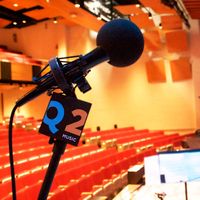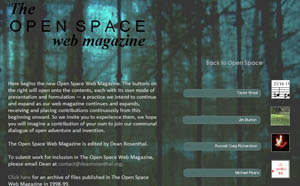
Sometimes, classical music gets a bad rap. To be perfectly honest, there is a chunk of the population that finds it to be synonymous with any number of derogatory terms: boring, annoying, or pompous. Some classical music lovers and advocates will counter this popular belief with arguments that only go to further the opinion of the other side: “Some people want to listen to mindless music”, “Some people simply don’t have patience”, etc. These ridiculous arguments only go to further the stereotype that classical music lovers are all pompous windbags who believe themselves to be uniquely educated and informed.
How, then, do we get people to forget their misconception, and believe that EVERYONE can enjoy or even love classical music, regardless of education, socioeconomic standing, or profession?
It all comes down to how classical music is presented; and now, for a limited time, you could join one organization that does it right.
We Remember September 11 // 24 Hour WPRB Live Radio Marathon
At the 10th anniversary of September 11, Classical Discoveries with Marvin Rosen will present a 24 hour live radio marathon, totally devoted to music written by composers from many countries as a reaction to the unforgettable events of that day. The program will air on WPRB 103.3 Princeton and around the world at www.wprb.com and will start on Saturday, September 10 at 7:00pm ET until 7:00pm the next day, Sunday, September 11, 2011. Marvin has already in quite impressive collection of 9/11 works some of which have already been broadcasted on his program, but he would like to get other compositions as well.
The call is for music written as a reaction to 9/11 that is within the Classical Discoveries and Avant-Garde Edition format, for any combination of instruments, voices and electronics. Non-commercial recordings are accepted as long they have good quality sound and are on CD (no MP3 and DVDs).
If you are sending a private recording:
§ You must have the name of the composer, title, and timing marked on the CD
§ all information including performers, composers bio, notes about work, should fit in the CD tray.
§ CD should be placed in a plastic CD case to prevent scratching
§ Broadcast release form should be attached
Each composer whose work is selected will be notified prior to the broadcast.
Unused CDs will be not returned to composers, except if prepaid envelope is attached
Before sending any recordings, please contact Marvin for his postal mailing address at: marvinfor911@gmail.com. Marvin has established this special e-mail address so that no mail will be lost. He will answer within 10 days of each inquiry, but if no answer is received please resend your email.
Deadline for accepting recordings is Friday, August 12, 2011.
For more information closer to the Marathon check the Classical Discoveries website, or Marvin’s new blog MarvinTheCat.
Ah, this the Golden Age, my friends, when the mellifuous sound of Autotune is everywhere, bringing dulcet harmony and order to everything from the latest pop and hip-hop singles worldwide to even the news. And now, thanks to the inspiration of Toronto composer Matthew Reid, even to the veritable sounds of “silence” as well!… Of course we all know that John Cage‘s iconic piece 4’33” is not really three movements of silence; the point is that those movements frame and draw attention to all of the other sounds present in the space where the piece is being played. What Reid has done is to create a performance of 4’33”, and then turn Autotune loose on that “silent” background. It turns the ambiance of the space into the sound of ghostly choirs and tiny chordal outbursts. While the Cageian purist might say this undermines the whole point of the piece (listening to the sounds that be as themselves), to me there’s a bit of innovation and subversion that recalls the twinkle in Cage’s own eye:
[youtube]http://www.youtube.com/watch?v=kEtcHc8rJQQ[/youtube]
 …Though it never really closed… Started around 1998 in upstate New York by a small group of musicians including Benjamin Boretz, Mary Lee Roberts and Arthur Margolin, The Open Space was conceived as print and online magazine venture and CD publisher dealing with contemporary music as “…output from a community for people who need to explore or expand the limits of their expressive worlds, to extend or dissolve the boundaries among their expressive-language practices, to experiment with the forms or subjects of thinking or making or performing in the context of creative phenomena. We want to create a hospitable space for texts which, in one way or another, might feel somewhat marginal — or too ‘under construction’ — for other, kindred publications.”
…Though it never really closed… Started around 1998 in upstate New York by a small group of musicians including Benjamin Boretz, Mary Lee Roberts and Arthur Margolin, The Open Space was conceived as print and online magazine venture and CD publisher dealing with contemporary music as “…output from a community for people who need to explore or expand the limits of their expressive worlds, to extend or dissolve the boundaries among their expressive-language practices, to experiment with the forms or subjects of thinking or making or performing in the context of creative phenomena. We want to create a hospitable space for texts which, in one way or another, might feel somewhat marginal — or too ‘under construction’ — for other, kindred publications.”
Given that they may have jumped into the pool just a tad early web-wise, and given the loose nature of of the project along with the busy and evolving schedules of the editors, The Open Space has tended to offer up things in spurts; the print magazine’s last issue was from late 2009, and the website languished for quite a while. Still, as befits an “open space” there has always been a very interesting accumulation of various article, scores, recordings and sound files available on their site, well worth a contemporary musician’s time to sift through. You can order CD recordings and back copies of the print magazine right from the site, as well.
Just last year, composer Dean Rosenthal signed on to get the purely digital webmagazine up and running again, and Dean’s happy to announce the first “issue” is online and available. The current form is a collection of contributions from various composers, of streaming recordings/video of selected works, some coupled with notes and scores of the piece. First offerings include such outside-the-mainstream luminaries as Michael Pisaro, Henry Gwiazda, Richard Coldman and Howard Skempton and others. And of course Dean is always happy to recieve submissions from you composers/performers out there, so why not give it a shot and help populate that open space with even more art and exploration!
Head’s up on a couple things this coming week that caught my eye:
 WPRB’s Marvin Rosen is doing a special edition of his Classical Discoveries radio show this Wednesday, Jan. 27th. From 5:30 until 11:00 AM EST. Titled “East Meets West“, the entire five-and-a-half hours will be devoted to works by Middle and Far Eastern Composers, as well as to works by Western composers inspired by these regions. A special treat in the 10-o’clock hour will be the world premiere broadcast of the Sonata for solo viola Op. 423 (1992) by Alan Hovhaness (1911-2000), performed by Christina Fong (from a brand-new OgreOgress release). Then from 11AM until 1PM, Marvin’s guest will be composer/improviser/percussionist Lukas Ligeti. A swell time all around, and as always no matter where you are your computer can bring you the broadcast live.
WPRB’s Marvin Rosen is doing a special edition of his Classical Discoveries radio show this Wednesday, Jan. 27th. From 5:30 until 11:00 AM EST. Titled “East Meets West“, the entire five-and-a-half hours will be devoted to works by Middle and Far Eastern Composers, as well as to works by Western composers inspired by these regions. A special treat in the 10-o’clock hour will be the world premiere broadcast of the Sonata for solo viola Op. 423 (1992) by Alan Hovhaness (1911-2000), performed by Christina Fong (from a brand-new OgreOgress release). Then from 11AM until 1PM, Marvin’s guest will be composer/improviser/percussionist Lukas Ligeti. A swell time all around, and as always no matter where you are your computer can bring you the broadcast live.
 If you happen to be on the other coast that same day (Jan. 27th), you’re in for a treat if you head to the Pasadena Central Library (Donald R. Wright Auditorium, 285 E. Walnut St.) at 6PM PST, for a concert presented by Cellogrill (über-cellist Jessica Catron) and the Pasadena Creative Music Series. The concert opens with the world premiere of composer Cat Lamb’s Branches for just-intoned female choir assembled especially for this occasion. Next up, MISSINCINATTI follows with folk songs of land and sea; forgotten tales about fantastical crocodiles, maritime ghosts and work in the mines illuminated before your very eyes with the assistance of many special musical guests. And finally, the compositions of RATS can confound and delight like a musical retelling of The Wizard of Oz by Captain Beefheart. And all this for the princely sum of FREE.
If you happen to be on the other coast that same day (Jan. 27th), you’re in for a treat if you head to the Pasadena Central Library (Donald R. Wright Auditorium, 285 E. Walnut St.) at 6PM PST, for a concert presented by Cellogrill (über-cellist Jessica Catron) and the Pasadena Creative Music Series. The concert opens with the world premiere of composer Cat Lamb’s Branches for just-intoned female choir assembled especially for this occasion. Next up, MISSINCINATTI follows with folk songs of land and sea; forgotten tales about fantastical crocodiles, maritime ghosts and work in the mines illuminated before your very eyes with the assistance of many special musical guests. And finally, the compositions of RATS can confound and delight like a musical retelling of The Wizard of Oz by Captain Beefheart. And all this for the princely sum of FREE.
 My long-time favorite MP3 download site eMusic has its own little online magazine. One of its features is “Jukebox Jury”, where a musician sits down with the interviewer to chat while listening to and commenting on various tracks played. The latest guest is none other than the N.Y. Philharmonic’s new Music Director, Alan Gilbert. The interview covers a lot of ground in a nicely casual way, with Gilbert listening and then giving his take on everything from his own conducting of Mahler’s 9th Symphony, to tracks featuring Christopher Rouse, Magnus Lindberg, Art Tatum, Uri Caine, John Adams, even The Field and Radiohead.
My long-time favorite MP3 download site eMusic has its own little online magazine. One of its features is “Jukebox Jury”, where a musician sits down with the interviewer to chat while listening to and commenting on various tracks played. The latest guest is none other than the N.Y. Philharmonic’s new Music Director, Alan Gilbert. The interview covers a lot of ground in a nicely casual way, with Gilbert listening and then giving his take on everything from his own conducting of Mahler’s 9th Symphony, to tracks featuring Christopher Rouse, Magnus Lindberg, Art Tatum, Uri Caine, John Adams, even The Field and Radiohead.
 Full of food and drink, playing with those presents, a couple days now to relax… How about capping the holiday huddled around the warm, cozy glow of the old ‘puter?
Full of food and drink, playing with those presents, a couple days now to relax… How about capping the holiday huddled around the warm, cozy glow of the old ‘puter?
Because this Sunday the 27th, beginning at 1900 (7pm) EST and running all the way until Monday evening at 1900 (7pm) EST, our new-music radio host-with-the-most Marvin Rosen is having his annual Viva 21st-Century – Women Composers Edition 24-hour broadcast marathon. We’re talking all-women, all-the-time, and all things written only from 2000 ’till today! You’re bound to be enlightened, and possibly even amazed, with much of what you’ll hear. Your geography doesn’t matter either, because wherever you’re at you only need click to WPRB’s live stream and you’re good to go.
So pay a visit; your ears will thank you. And if inclined give a shout to Marvin himself for pushing himself to push this music, and so push you into a greater awareness of all the wonderful stuff being written by women composers in the here and now. (Marvin sez: “Wake up phone calls during this marathon will be welcome“…)

On those longer, cooler, grayer days, stuck inside with a little time on our hands, one of the nicer pastimes for the music buff is to wander through the Flickr music photo pools. Two especially for the contemporary musician: the Classical Music pool and the Experimental Music pool. Between them, with some thousands of amateur-to-pro photographers clicking away in all corners of the world, you can get a feel for the people, activities and concerns that make our music live and breathe today. Often, a striking image will mention a name or two that will get me started googling (or is that “binging” now?), and lead me to some wonderful composer, performer or event that I might otherwise have never encountered. But more than anything it’s just that glimpse of all the people in that bigger world, who have our same shared passion and work at it every day, that puts a little smile on my lips while browsing.

 Received a blurb from the LA Phil the other day, which in all caps proudly declares “LA PHIL LAUNCHES MICROSITE CELEBRATING INCOMING MUSIC DIRECTOR GUSTAVO DUDAMEL” … Kaboom!… Here’s the relevant bit (my bolds):
Received a blurb from the LA Phil the other day, which in all caps proudly declares “LA PHIL LAUNCHES MICROSITE CELEBRATING INCOMING MUSIC DIRECTOR GUSTAVO DUDAMEL” … Kaboom!… Here’s the relevant bit (my bolds):
On September 24, 2009, the LA Phil launched a microsite celebrating the arrival of incoming Music Director Gustavo Dudamel. Introducing audiences worldwide to Gustavo in new and engaging ways, the comprehensive microsite, located at http://www.laphil.com/gustavo, features videos such as Gustavo’s first rehearsal with the YOLA Expo Center Youth Orchestra, the LA Phil’s video tribute “Welcome Gustavo,” and the press conferences unveiling Gustavo’s inaugural season and appointment as 11th Music Director of the LA Phil. Visitors can also take a multimedia journey through Gustavo’s life with tiling photographs, video and biographical text. The latest Gustavo-related news and newly recorded audio and video content will be added to the microsite as Gustavo’s exciting inaugural season progresses.
The Gustavo microsite prominently features a brand-new interactive online game and iPhone application, Bravo Gustavo, designed by Hello Design to simulate the experience of conducting an orchestra. The Bravo Gustavo online game invites users to interact with Gustavo and the LA Phil performing Berlioz’ Symphonie Fantastique (music courtesy of Deutsche Grammophon). The Bravo Gustavo iPhone application adapts the mobile device into a conducting baton, utilizing the accelerometer to directly affect the overall tempo and note duration of the music – just like a real conductor.
Wow, conductor as new “my best friend forever”, and it seems like the only thing missing from the package is the action figure. I suppose if the classical world had been cool enough to do a “Bravo Herbert” or “Welcome Antal” back in the day, the crowds would never have left.

